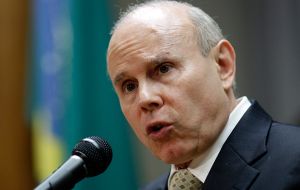MercoPress. South Atlantic News Agency
Brazil economic activity picks up in July, but will end below 2% in 2012
 Minister Mantega admits the economy has slowed down
Minister Mantega admits the economy has slowed down Brazil’s economic activity rose more than forecast in July, posting the biggest expansion in almost a year. The non-seasonally adjusted economic activity index rose 2.34% from a year earlier after rising 0.99% in June, the central bank said in a report.
Growth in July was the fastest since 3.04% in August 2011, while seasonably adjusted the increase was 0.42%.
The report is the latest sign that Brazil’s economy is turning the corner and is unlikely to need any further monetary stimulus. Since August 2011, the administration of President Dilma Rousseff has lowered interest rates more than any other Group of 20 nations to record 7.5%, cut taxes on company payrolls and consumer goods and encouraged banks to lower lending costs.
Central bank President Alexandre Tombini on September 12 told a Senate hearing that economic growth is set to accelerate in the remainder of this year and through 2013.
While Brazil expanded an annualized 1.64% in the second quarter, less than Japan and the U.S., recent indicators point to a pick-up in activity. Retail sales beat economists’ forecasts in July, rising at the second-fastest pace since January, and automobile sales in August soared to a record high, spurred by tax breaks.
Still, Brazil’s industrial production in July fell 2.9% from a year ago as manufacturers struggle with high costs of doing business and uncertainty in the global economy. Consumer loan defaults matched a 30-month high in the same month, even as government officials have said that figure will fall.
Earlier in the week Finance Minister Guido Mantega cut his 2012 growth forecast to 2% from 3%. That would be the weakest annual performance since 2009 and a sharp slowdown from growth of 7.5% in 2010. Last year growth was 2.7%.
Rising wages and a spike in food and beverage costs also led the pace of consumer price increases to quicken for the second straight month in August, to 5.24%. Inflation will slow to the central bank’s 4.5% target in a “non- linear” way during the rest of the year, Tombini said.
But the basic line is that expensive energy, poor infrastructure and increasing labour costs - known as “Custo Brasil” or the “Brazil Cost” - have weighed on growth, analysts say.




Top Comments
Disclaimer & comment rules-

-

-

Read all commentsI remember earlier this year the prat Mantega claimed that the downturn was over and that he was very confident the figure would be 3.5%
Sep 15th, 2012 - 03:51 pm 0I said he should go then as he clearly did not understand what was going on and 1.0% would be good (remember the accuracy of determination is at least +/- 0.5%).
I will stay with that; it's not the end of the year yet.
That's the result of populism.
Sep 15th, 2012 - 10:37 pm 0“Brazil’s economic activity rose more than forecast in July”
Sep 16th, 2012 - 09:32 pm 0...proving the haters on here wrong...
Commenting for this story is now closed.
If you have a Facebook account, become a fan and comment on our Facebook Page!